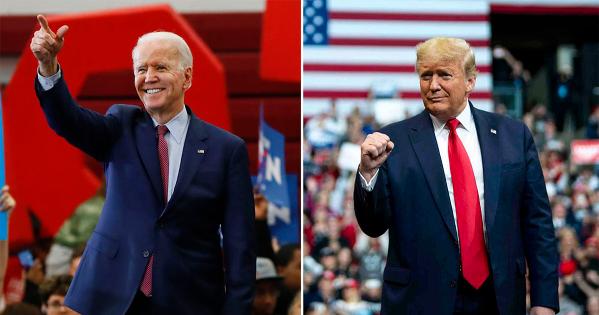Does Allan Lichtman Stand by His “13 Keys” Prediction of a Joe Biden Win?

With just a few days left until Election Day, do Allan Lichtman’s “13 Keys” still predict a Joe Biden victory? Or have events this fall changed the way the keys turn?
Lichtman, AU Distinguished Professor of History, made headlines in 2016 when he accurately predicted that Donald J. Trump would win the race for the White House. It was considered an incredible feat, given that all other major election forecasters got it wrong.
But this time around, Lichtman’s prediction agrees with all of the other models: he says that Joe Biden will become the next President of the United States.
Lichtman bases his predictions on 13 Keys that he developed in collaboration with Vladimir Keilis-Borok, a Russian expert on earthquakes. Their 13 keys have accurately predicted every US presidential race since 1984.
To develop the keys, Lichtman and Keilis-Borok analyzed presidential elections over the past 120 years, and they based their prediction model on earthquake models. If just six of the 13 keys turned against the incumbent, they are in for a loss. Right now, Lichtman says, Trump has seven keys turned against him.
We asked Lichtman to describe how the keys are turning right now, and how the pandemic, the fight for racial justice, the economy, and other issues affect our presidential elections.
In 2016, your 13 keys correctly predicted a Trump win. In 2019, the keys pointed towards another Trump win. But that has now changed. How many keys are turned against Trump right now?
There are seven keys turned against Trump, one more than is needed to predict his defeat according to the Keys to the White House system that has correctly predicted the outcomes of presidential elections since 1984. The negative keys are:
- Key 1, Mandate Key, because of Republican losses in the midterm elections of 2018.
- Key 5, Short-Term Economic Key, because of an election-year recession.
- Key 6, Long-Term Economic Key, because of the sharply negative growth this year.
- Key 8, Social Unrest, because what is raging across the land.
- Key 9, Scandal, Trump is only the third American president to be impeached by the full US House of Representatives.
- Key 11, Foreign/Military Success, because of the lack of an acclaimed success abroad.
- Key 12, Incumbent Charisma, because Trump appeals only to a narrow base.
How have the pandemic and the protests for racial justice turned the keys?
It was not just the COVID-19 pandemic that crashed the economy, it was also Trump’s botched response to the pandemic. Rather than dealing substantively with the pandemic, Trump thought he could talk his way out of it, reverting to his 2016 playbook when he was the challenger. It didn’t work for the nation, or for his reelection, as the unchecked pandemic produced a recession, which cost him Key 5, and sharply negative economic growth, which cost him Key 6.
Along with Trump’s failure to respond to cries for social and racial justice, the failed response to the pandemic also contributed to social unrest, which cost him Key 8. Thus, Trump went from four keys down in 2019 to his current seven keys down.
Never in the history of the United States has the White House party suffered such a sudden and dramatic reversal of fortune in just a few months.
Republicans have traditionally been very good at registering voters, and this year they had a surge in voter registration in swing states like Florida and Pennsylvania. Do these affect the keys—or could they even influence who wins the presidential election?
Registration numbers ebb and flow, but do not change a key.
One of the keys is “major foreign or military successes.” Do events like the recent peace agreements in the Middle East affect this Key?
The treaty between Israel and the Gulf states and Sudan does not earn Trump Key 11. I almost never turn a key based on a treaty unless it is of great significance and broadly acclaimed in the United States. Since I began predicting elections according to the Keys prior to the 1984 election, I have turned Key 11 for the White House party only once, for the monumental arms control treaty between the US and the Soviet Union during the second term of President Ronald Reagan.
I did not turn the key for the Democrats for the 1994 treaty between Israel and Jordan, a much more important nation than the ones involved in the current treaty. The current treaty has barely made a ripple in the United States. It is hardly mentioned during the campaign even by Trump.
We’re so close to the election, but there is so much going on in our nation. Has anything else, from protests in Philadelphia to the surging pandemic numbers, alerted you to the possibility of any surprises next week?
The incumbent charisma Key 12 is a high threshold key that turns only for a once-in-a-generation broadly inspirational candidate like Franklin Roosevelt for the Democrats or Ronald Reagan for the Republicans, both of whom brought many new voters into the fold. Trump is a showman, but he only appeals to a narrow base of fervent followers. More than 60 percent of the public don’t like him personally and don’t believe that he is honest and trustworthy.
When I retrospectively developed the keys, I did not give the charisma key to Barry Goldwater in 1964 or George McGovern in 1972, both of whom, like Trump, appealed to a narrow base of passionate followers. Trump did not meet the key’s criteria as a challenger and does not as an incumbent.
The keys gauge the big picture of incumbent strength and performance, with the message that it is governing not campaigning that counts in presidential elections. They do not readily change. They have never changed in the few weeks prior to an election.